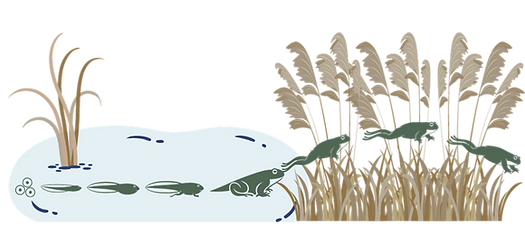What we do
From genome to ecosystem, mountain to coast, and gamete to adult, we study adaptation and resilience in a changing world. Our work centers on amphibians and aquatic systems, but we follow the questions wherever they lead.

Salty amphibians
Amphibians are often considered too salt-sensitive to survive in coastal habitats. But research, including ours, reveals surprising salt tolerance and signs of local adaptation. We're investigating the physiological mechanisms, ecological contexts, and evolutionary pathways that shape how frogs adapt to salt and the costs of surviving in a salty world.
Eco-toxicology
Pollutants, from microplastics to chemical runoff, are flooding into wetlands, reshaping the world in which we all live. We study how different contaminants, exposure routes, and ecological contexts impact amphibian health and development.
.png)
.png)
Phenotypic plasticity
Phenotypic plasticity is the ability of taxa to adjust their development, behavior, and physiology in response to environmental conditions. We study how these adjustments are produced and how they influence ecological performance, life history, and evolutionary outcomes.
Life in Stages

In taxa with complex life cycles (like amphibians), life events like growth and reproduction are structured across distinct stages. We investigate how within-stage processes scale up to shape population dynamics, shift the importance of stages, and influence evolutionary trajectories.
Funding
We are grateful to live in a country that supports basic science and research. We thank our current funders for making this work possible.

Link to NIH RePORTer

Link to NSF Award Details
In collaboration with Molly Womack (Cornell)